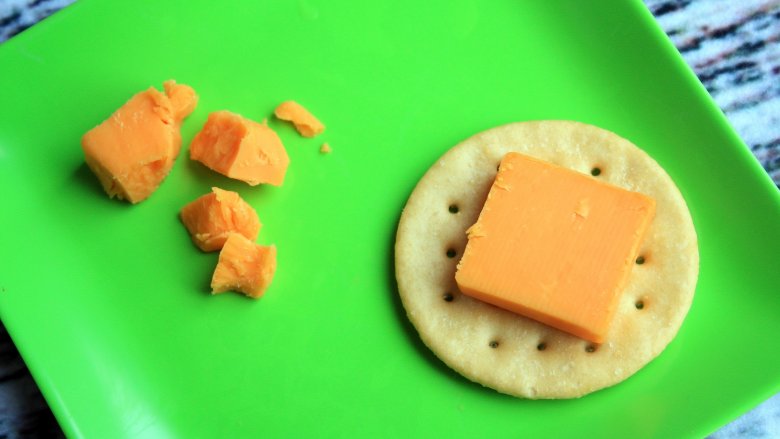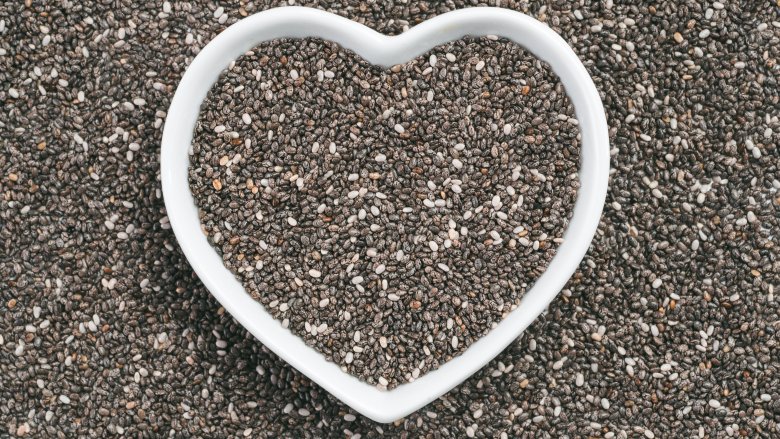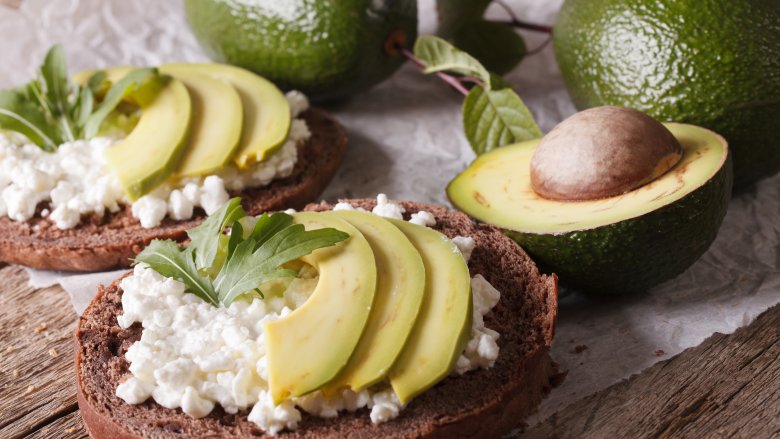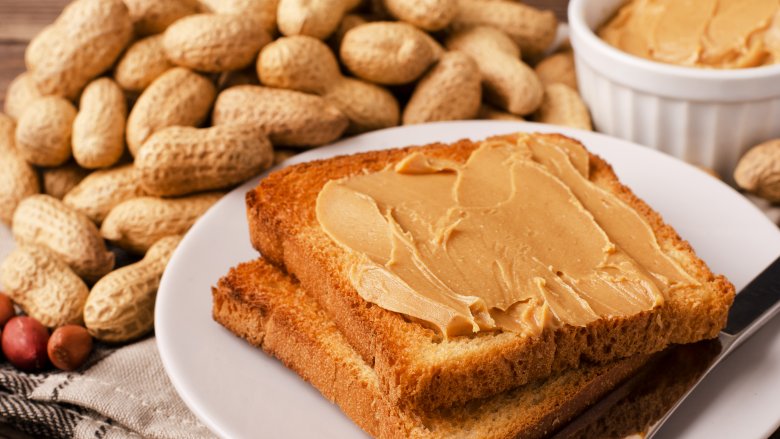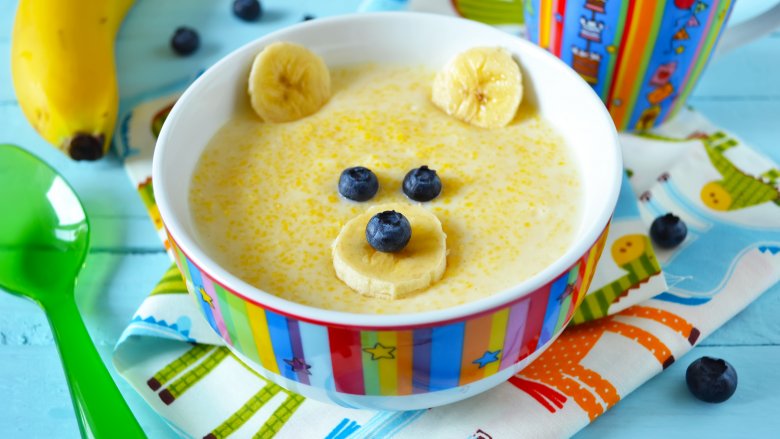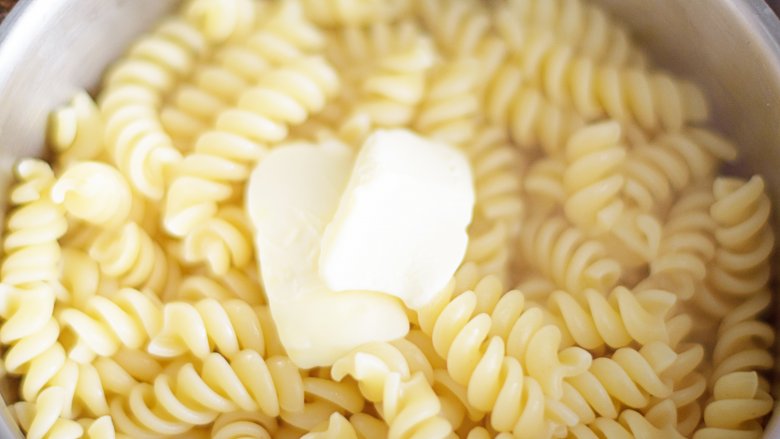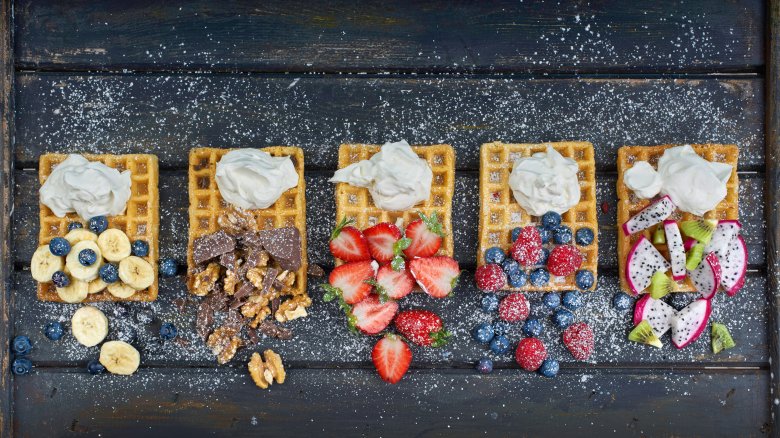The Best Foods To Help Your Baby Gain Weight
New parents want to do the very best for their little ones and get them a great start in life, but it's not always clear-cut as to what should be on the menu. When baby isn't gaining weight like he or she should be, it can lead to a lot of questions and many sleepless nights.
There are a lot of different reasons a baby might not be thriving quite like their peers, but one solution might be to add some high-calorie foods to their diet. According to SFGate, babies need between 50 to 55 calories per pound of body weight per day for the first 6 months of life, then a little less — around 45 calories per pound per day — after that. It's important to note, though, that's just a guideline, and your baby could have different needs.
Physicians at UpToDate note that slow weight gain in babies might be a sign of an underlying cause, and stress that if you're worried, it's important to talk to your pediatrician. But sometimes, babies just need some extra calories and healthy fats to put on enough weight to keep them in normal range, and if that's the case, here are some healthy foods that will help your baby grow up big and strong. Remember, adding extra calories doesn't mean adding unhealthy foods — just choosing the right healthy ones.
Breast milk and fortified breast milk
The idea that breast milk is best has been repeated a lot, and part of the reason for that is it's been linked to the development of healthy weight gain. According to a 2018 study in Pediatrics (via Medical Daily), babies who are exclusively raised on breast milk until at least six months of age have a better chance of being at a healthy weight — not overweight or underweight — at their first birthday. They also found that not all breast milk is the same: when babies were given pumped milk, they gained more weight. While they're not entirely sure why there's such a pronounced difference, they speculate that it has something to do with the freezing and thawing process interfering with the activity of valuable enzymes.
That said, it's entirely possible that some babies might still need a little bit extra, even when they're only being fed breast milk. According to Children's Hospitals Minnesota, fortifying breast milk with powdered formula can be an excellent way to increase the calories they're getting while still getting all the goodness of breast milk. Medical research largely agrees that this should meet all your baby's dietary needs until they're around five or six months old.
Cheese
According to Medical Daily, there's a very real danger in introducing your baby to solid foods before they've reached five months old. Studies have shown there's an increased risk of an unhealthy amount of weight gain, and the best time to start adding solids to baby's diet is when they're between five and seven months old.
That said, adding certain high-calorie solid foods is a great way to also add extra calories and help a baby who's developing slowly. The University of Wisconsin says cheeses are a great way to add those extra calories, and notes that not only can cheddar cheese and soft goat cheese be offered as finger foods, but cheeses of all kinds — and cream cheese — can also be used as additives in other foods. Hide a dollop in mashed potatoes or pureed vegetables, or melt over rice or pasta.
There is one word of caution to be added to this one, though. Since dairy is often allergenic, the Australian Society of Clinical Immunology says you should introduce them slowly, and don't add any other potential allergens to your baby's diet along with the cheese. That way, you'll be able to keep an eye out for any potential allergic reaction, and you'll know what caused it.
Seeds
When we talk about seeds, we're talking about ground seeds used as an additive to other types of food. The University of Wisconsin recommends ground flaxseed and chia seeds in particular, as they not only come with some much-needed calories, but other benefits, too.
Healthline says that a single tablespoon of flaxseed comes with 37 calories. That's not a lot for an adult, but when it comes to baby, that's a powerful caloric punch. There are also a bunch of healthy fats and omega-3 fatty acids, all good for a growing baby.
They also say that chia seeds come with a whopping 138 calories per ounce, and they, too, are high in good fats while being naturally sugar-free. There's a bonus to this one, too. Since they have a very mild, bland taste, they're easy to hide in other foods. When you're just starting baby on solid foods, everything is new and different and weird. Even the pickiest eater won't notice if you sprinkle some ground chia seeds into a food they already like, and anything that makes mealtimes easier is a complete win!
Avocado
Avocado might have a reputation as a trendy hipster food, but it's also great for babies who need a little extra help gaining weight. VeryWell Family says they're one of the perfect foods to start baby on, and that goes double for babies who are having a bit of trouble putting on weight.
They'll raise baby's daily calorie intake, along with giving them all kinds of heart-healthy fats and omega-3 fatty acids. That's great, and here's the really neat thing about avocados.
Most of the avocados you'll find in the store are either Florida or California avocados. If you want something filled with the extra goodness baby needs, be sure you get the California variety. That'll have twice the fat and about a third more calories than the Florida version, and that's what you're going to want to give your little one. A single ounce of California avocado has about 50 calories and 4.5 grams of total fat. Win, right? It gets better: the unique texture of the avocado is great for a baby just learning what solid food is all about, and it can be either pureed or cubed for a quick and healthy snack.
Yogurt
Different types of yogurt have different types of benefits, and according to SFGate, it's only whole milk yogurt that's suitable for babies. The extra additives that come with fat-free or low-fat yogurt makes it unsuitable for infants, but they can absolutely benefit from the good fats, calories, probiotics, and vitamins in whole milk yogurt.
If you're concerned about your baby trying to digest the often difficult enzymes found in milk, rest easy. According to Happy Family Organics, the fermentation process used to make yogurt does most of the heavy work for them. Yogurts are easy on the stomach, and when you pick up the types with no added sugar, you can be sure they're gaining weight thanks to the natural fat, calories and nutrients, not artificial sugars.
They also say that yogurt is gentle enough to be given to a baby once or twice a day — and that's important when you're trying to increase caloric intake. It's also versatile: serve it right out of the container, or add pureed fruit for yet another calorie boost.
Cottage cheese
Healthline calls cottage cheese "super healthy and nutritious," but it's definitely an acquired taste. It's the texture, right? But here's the thing: that same texture that makes it icky for many adults makes it perfect for baby. That's good news, because the University of Wisconsin calls it one of the best high-calorie foods for infants — especially considering that the only version you'll want to feed them is the full fat version.
But let's talk texture. Different cottage cheeses have different levels of chunkiness, but that can work in your favor if you're having trouble getting the little one to eat. You can puree it to change the texture to something that's more palatable, and since it has such a mild, bland flavor, you can also use it as a calorie-rich base to mix up a little snack you know she's going to like. Add pureed fruits, some avocado, ground seeds, a dash of seasoning, or even some beans. It's versatile enough that you're sure to find a way to get even the pickiest eater to like it, and if they grow up on it, they're more likely to keep eating this delicious cheese even after they're old enough to make decisions for themselves.
Eggs
Eggs are a little tricky, and here's why. For years, pediatricians recommended holding off on giving your baby eggs because of the potential for an allergic reaction. According to Healthline, the current recommendation is now to give eggs as one of an infant's first solid foods, and that's good news for a lot of reasons.
Australia's Women's & Children's Hospital says eggs are great not just as a high-calorie snack, but they're also a great base for adding other things to. Look at it this way: a single egg has around 70 calories, and that means a hard-boiled egg is great for a quick little meal. But it also means that if you scramble that same egg then add a bit of cheese, cream, or margarine, you've got an even higher-calorie breakfast that still has a baby-friendly texture and a mild taste. And since texture can be a huge deal for anyone, not just a baby, eggs are great for experimenting with. If he doesn't like scrambled or hard-boiled eggs, there are plenty of other options.
It's also worth mentioning, though, that as with other potential allergens, you should introduce eggs slowly and separately from other foods, so you know what's causing the reaction if one develops.
Nuts and nut butters
The University of Wisconsin says that nuts and nut butters are both excellent foods to give a baby to help boost weight gain, but there are a ton of disclaimers that come with this one.
Parents says that while there are plenty of nuts and nut butters — not just the peanut variety — that are great for a growing infant, you need to be careful about how you introduce them. That means never giving them whole nuts or a spoonful of nut butter. Both of those are choking hazards, so what should you do instead?
You can start by mixing a teaspoon of nut butter into something like applesauce or yogurt, and just making sure the texture has changed and the stickiness is gone. You could also use it as an ingredient in things like pancakes, waffles, and muffins, or you could even get more creative. If your little one likes pasta and noodles, replace the regular butter with nut butters, toss to coat, and serve it up for a tasty treat. It's also well suited to adding to a stew or gravy to give those soft veggies a completely different flavor, and not only will you be helping your baby's physical development, but you'll be teaching them to appreciate new flavors, too.
And, as with any allergen, introduce nuts slowly, separately, and watch for any reaction. Though nuts are a common allergy, recent research suggests that introducing them early and can reduce the risks of an allergy developing.
Sweet potatoes
While you're going to want to keep your baby away from artificial sweeteners and sugary foods, sweet potatoes can be an excellent way to add not just some high-calorie options to the menu, but to expose them to a flavor that's completely unlike any other. The University of Wisconsin says that not only is sweet potato mash an excellent option for any parent who needs to add some extra calories to their baby's plate, but that sweet potato fries are a great, high-calorie finger food to encourage babies who are starting to figure out how to feed themselves.
Parenting says there are all kinds of other benefits to sweet potatoes: they can relieve (and prevent) constipation, comes with a ton of vitamin A, and prevents anemia.
There's another bonus, too. If allergies are presenting a problem when it comes to finding high-calorie foods to encourage weight gain, sweet potatoes come with almost no risk of a negative reaction like the ones that potentially come with things like peanuts and eggs. It's also versatile enough that you'll be able to find something that'll have even the pickiest eater finishing their meals, whether that's sweet potato mash or a sweet potato and carrot soup.
Iron-fortified baby cereals
Not all cereals are created equal, that's almost painfully obvious during any trip down the cereal aisle. While adults pretty much have to choose between getting something that's delicious and unhealthy or bland and healthy, the good news is that it's much easier when it comes to picking out something to help encourage weight gain in your baby.
According to the Benioff Children's Hospital in San Francisco, iron-fortified baby cereals can be a great way to get extra calories and nutrition into your little one's diet.
If having a picky eater is one of the biggest problems you're facing, there's good news: this is another option that you can prepare in a number of ways, and hopefully, you'll find something that your baby likes. If you're having trouble getting them to transition from breast milk to solid food, mixing cereal with breast milk can be a great way to make the switch easier on them. You can also add a teaspoon or so to other foods that they might already like. Add it to yogurt, pureed fruit, veggies or meat, or even mix it in with eggs.
Pureed meats
According to Parents, babies can get started on meat not too long after they make their first foray into solid foods. It's not too surprising, but they add that getting your baby used to the texture is one of the biggest hurdles you'll need to overcome, and if you're trying to add some calorie-rich foods to your baby's diet to encourage weight gain, adding meat is going to make a huge difference in your baby's growth.
According to the Benioff Children's Hospital, pureed meats and poultry are an excellent way to get your baby eating more calories than fruits and vegetables alone can provide. They recommend pureeing meats in a food processor until they're a consistency your baby can handle (and that's going to depend on the age of your little one). Then, there are a few different things you can do. Add the meat puree to a solid food your baby is already eating, a little bit at a time, to introduce the new flavors. (You can even add breast milk or formula to help with the introduction.) You can even start mixing in some high-calorie additives like iron-fortified baby cereal, powdered baby formula, or ground seeds.
Oils and butter
When you're an adult, you're more likely to try to lose weight than gain it. Oil and butter are on the list of things to stay away from, but according to the Cincinnati Children's Hospital, a bit of butter or a dash of some healthy oils can help your baby get much-needed calories.
Oils and butter both have the advantage of being a calorie-heavy topping, which means it's easy to beef up what your baby is already eating with just a little bit of either butter or oil. Put a teaspoon of butter — dairy or soy-based — on your baby's vegetables, pasta, or mashed potatoes, and you can use oil in much the same way.
Choose a healthy oil, like olive or safflower, and use a teaspoon in pasta or on toast. You can also opt for getting out your baking pans, too, and making some healthy, butter-filled muffins, pancakes, or soft snack bars. The bonus to those? You can snack on them, too.
Waffles
When you baby isn't gaining weight like he or she should, mealtimes can become stressful and nothing short of anxiety-inducing. That might make the problem even worse, so let's talk about something fun you can make that you both can enjoy: waffles.
Waffles? Absolutely! The Cincinnati Children's Hospital says waffles are one of the best ways you can serve up a healthy helping of grains to a child who is underweight. Not only are waffles packed with calories, but they're also easy to cut into finger foods that are perfect for a baby who's just started munching on foods with more texture. They're also versatile when it comes to toppings, and they go great with a wide variety of tasty foods that are going to help you add still more calories. Top with pureed fruit, bananas, cottage cheese, a dollop of butter, or a spoon of fresh whipped cream.
Sure, they might be a bit more complicated to make than just popping open a jar of baby food, but you can treat yourself, too. Make your own waffles, top them with something special, and take the opportunity to sit down and eat with your baby. Food is a family affair, after all, and let's be honest: you deserve it.


